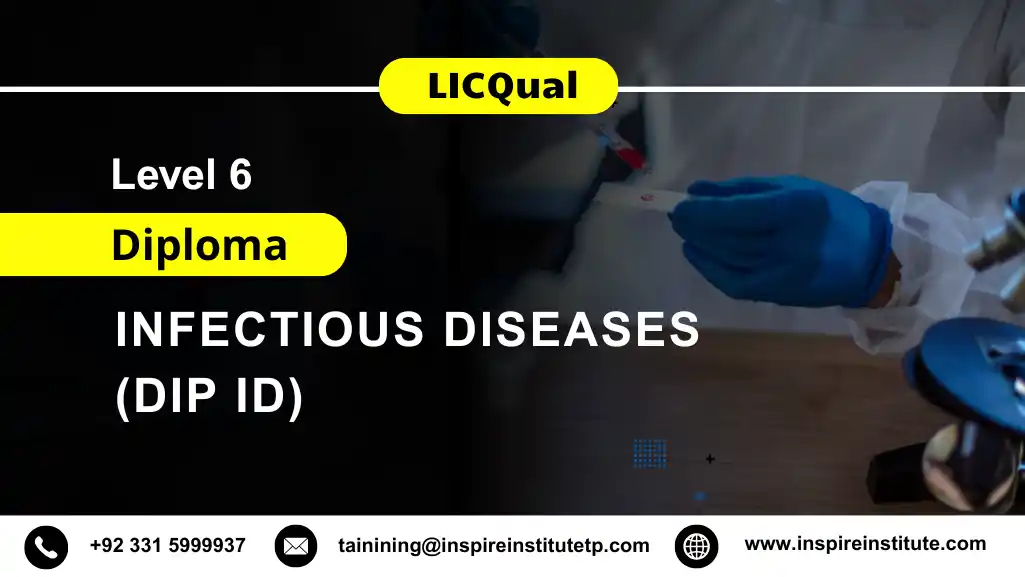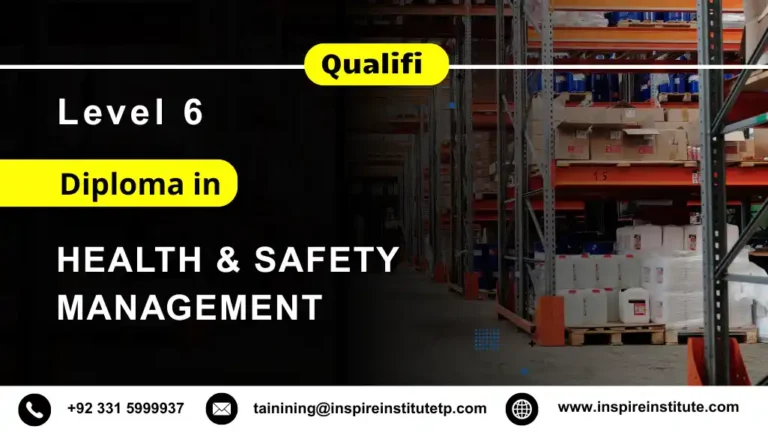LICQual Level 6 Diploma in Infectious Diseases (Dip ID)
The LICQual Level 6 Diploma in Infectious Diseases (Dip ID) is a UK-accredited qualification designed for healthcare professionals, microbiologists, and medical researchers who seek to advance their expertise in diagnosing, managing, and preventing infectious diseases. In an era where global health challenges such as pandemics, antibiotic resistance, and emerging pathogens are increasingly significant, this diploma equips learners with the essential knowledge and practical skills to respond effectively to complex infectious disease scenarios. The program blends rigorous academic theory with evidence-based clinical practice to prepare professionals for leadership roles in healthcare and research settings.
This assignment-based qualification focuses on the core principles of infectious diseases, including epidemiology, microbiology, immunology, and virology. Learners explore critical topics such as bacterial, viral, fungal, and parasitic infections, emerging pathogens, infection control strategies, and outbreak management. By integrating high-impact learning materials with practical case studies, the program ensures participants develop a comprehensive understanding of disease mechanisms, transmission patterns, and prevention strategies.
Practical applications are a key component of the LICQual Level 6 Diploma in Infectious Diseases. Learners gain competence in clinical assessment, diagnostic testing, antimicrobial stewardship, and infection control protocols. Through simulated scenarios and real-world case studies, participants develop skills to design and implement effective management plans for patients, healthcare institutions, and public health initiatives, enhancing patient safety and reducing disease spread.
Why Choose this Qualification
The LICQual Level 6 Diploma in Infectious Diseases (Dip ID) is a UK-accredited program designed for healthcare professionals, medical researchers, and microbiologists who aim to gain advanced expertise in infectious diseases. This qualification combines theoretical knowledge with practical applications, preparing learners to tackle complex clinical and public health challenges. It ensures measurable skills development, evidence-based competencies, and career advancement opportunities in global healthcare settings.
Key Reasons to Choose this Qualification
Specialist Knowledge
- Gain comprehensive understanding of infectious disease mechanisms, including bacterial, viral, fungal, and parasitic infections.
- Study epidemiology, immunology, and virology to interpret disease patterns and outbreaks.
- Learn advanced diagnostic and laboratory techniques for accurate disease identification.
- Understand global health threats, emerging pathogens, and antimicrobial resistance.
- Apply evidence-based guidelines in clinical and public health settings.
Practical Application
- Develop hands-on skills in infection control, outbreak management, and antimicrobial stewardship.
- Conduct case-based assessments for accurate diagnosis and treatment planning.
- Apply laboratory and clinical techniques for monitoring and controlling infections.
- Learn to implement preventive strategies in hospitals, clinics, and community health settings.
- Integrate multidisciplinary approaches for effective patient and population health management.
Recognised Qualification
- Earn a UK-accredited diploma recognized internationally in healthcare and research sectors.
- Demonstrates mastery in infectious disease management and clinical competencies.
- Enhances credibility for roles in hospitals, public health organizations, and research institutes.
- Meets global standards for professional and academic development.
- Opens opportunities for advanced postgraduate studies or specializations.
Flexible Learning Pathway
- Study through a fully assignment-based structure suitable for working professionals.
- Progress at your own pace while balancing clinical or research responsibilities.
- Access online resources, mentorship, and academic guidance throughout the program.
- Flexible deadlines ensure a stress-free, practical learning experience.
- Blend theory with practical skills without disrupting professional duties.
Evidence-Based Training
- Learn to critically analyze current research and scientific literature in infectious diseases.
- Apply evidence-based strategies for diagnosis, treatment, and prevention.
- Stay updated on global guidelines and health policies for infectious disease control.
- Enhance decision-making skills based on validated clinical protocols.
- Promote safe, effective, and scientifically-informed patient care.
Career Development
- Prepare for roles such as Infectious Disease Specialist, Clinical Microbiologist, or Public Health Advisor.
- Enhance employability across hospitals, research centers, and international health organizations.
- Gain leadership skills for managing healthcare teams and outbreak responses.
- Open pathways to consultancy, academic, and research-based careers.
- Strengthen professional portfolio for promotions or higher-level responsibilities.
Enhanced Patient Care
- Deliver patient-centered care focusing on safety, ethical responsibility, and infection prevention.
- Manage complex cases involving multi-drug resistant organisms or emerging pathogens.
- Improve patient outcomes through effective treatment and preventive strategies.
- Promote awareness and adherence to infection control measures in clinical settings.
- Develop cultural sensitivity and communication skills to support diverse patient populations.
Professional Growth
- Build critical thinking, analytical, and problem-solving skills essential for healthcare leaders.
- Enhance clinical judgment, decision-making, and interdisciplinary collaboration.
- Foster lifelong learning and reflective practices in infectious disease management.
- Develop resilience and adaptability in high-pressure healthcare environments.
- Position yourself as a skilled, globally-competitive professional in infectious diseases.
The LICQual Level 6 Diploma in Infectious Diseases (Dip ID) provides measurable expertise, practical skills, and internationally-recognized credentials. It equips healthcare professionals to excel in clinical practice, public health, and research, making a meaningful impact on global health outcomes. recognition and advancing psychiatric practice worldwide.
Course Overview
LICQual UK Awarding Body
Average Completion Time:
6-24 Months
Study Units: 6 Units
Evidence & Assignment Based
Mandatory Units
Who Should Take This Course
This course is suitable for healthcare professionals, researchers, and clinical practitioners who wish to advance their expertise in infectious diseases. The LICQual Level 6 Diploma in Infectious Diseases (Dip ID) equips learners with comprehensive theoretical knowledge, practical skills, and evidence-based competencies to manage infectious diseases effectively in clinical, research, and public health settings. It is ideal for individuals aiming to enhance their career prospects, contribute to patient care, and meet global healthcare standards.
This course is suitable for
Medical Doctors and Physicians
- Gain advanced knowledge in diagnosis, treatment, and prevention of infectious diseases.
- Apply evidence-based practices in hospital and clinical settings.
- Enhance clinical decision-making and patient management skills.
- Develop competencies in outbreak response and infection control protocols.
- Strengthen ability to manage complex or emerging infectious cases.
Nurses and Clinical Practitioners
- Acquire skills in infection prevention and patient care management.
- Implement clinical guidelines for antimicrobial use and infection control.
- Enhance competencies in patient education and public health awareness.
- Learn to monitor and manage infectious disease cases efficiently.
- Contribute effectively to multidisciplinary healthcare teams.
Microbiologists and Laboratory Scientists
- Gain expertise in diagnostic techniques, microbial culture, and pathogen identification.
- Learn to interpret laboratory results for clinical application.
- Apply advanced laboratory skills in epidemiology and outbreak investigation.
- Develop proficiency in antimicrobial resistance testing.
- Contribute to research and development in infectious disease management.
Public Health Professionals
- Understand epidemiology, surveillance, and disease control strategies.
- Learn to design and implement community health interventions.
- Enhance skills in outbreak monitoring and reporting.
- Develop evidence-based policy recommendations for infection prevention.
- Collaborate with healthcare organizations to improve population health outcomes.
Medical Researchers
- Strengthen research methodology and clinical trial design in infectious diseases.
- Analyze and interpret data for effective disease management strategies.
- Contribute to publications, scientific studies, and global health research.
- Apply theoretical knowledge to practical research scenarios.
- Innovate solutions for emerging infectious threats.
Healthcare Managers and Administrators
- Develop strategies for infection control and hospital safety protocols.
- Oversee implementation of clinical guidelines and staff training.
- Enhance decision-making in resource allocation and outbreak management.
- Monitor compliance with public health regulations.
- Improve organizational preparedness for infectious disease emergencies.
Students and Graduates in Health Sciences
- Build foundational knowledge and practical skills in infectious diseases.
- Gain UK-accredited qualification recognized globally.
- Prepare for advanced studies, specializations, or professional roles in healthcare.
- Enhance employability in hospitals, research centers, and public health institutions.
- Develop a professional portfolio demonstrating expertise in infectious diseases.
Global Health Practitioners
- Address infectious disease challenges in diverse healthcare settings.
- Apply global best practices in disease prevention and treatment.
- Learn to manage infections in low-resource and high-risk environments.
- Strengthen cross-cultural communication and patient engagement skills.
- Contribute to international health initiatives and outbreak response teams.
The LICQual Level 6 Diploma in Infectious Diseases (Dip ID) is designed for professionals seeking measurable growth in knowledge, skills, and practical application. It prepares learners to excel in clinical, research, and public health roles, ensuring they can make a meaningful impact on global health outcomes.ers to deliver compassionate, evidence-based care and to contribute meaningfully to the advancement of mental health on both national and global levels.
Course Benefits
The LICQual Level 6 Diploma in Emergency Medicine (Dip EM) is a UK-accredited qualification designed for healthcare professionals, paramedics, and medical practitioners who aim to advance their knowledge and clinical skills in emergency medical care. This comprehensive, assignment-based diploma integrates theoretical foundations with practical applications, preparing learners to assess, diagnose, and manage a wide range of acute and life-threatening medical conditions with confidence and efficiency. By combining evidence-based learning with flexible study pathways, this programme equips professionals to respond effectively in high-pressure emergency settings.
Key Benefits of the Course
- Specialist Knowledge:
Gain a thorough understanding of emergency medicine principles, including trauma care, acute medical emergencies, resuscitation, and emergency pharmacology. Learners explore advanced topics such as cardiac emergencies, respiratory crises, neurological events, and shock management. The course also covers clinical guidelines, triage systems, and ethical considerations, enabling learners to deliver safe and effective patient care in urgent scenarios. - Practical Application:
Develop hands-on competence in patient assessment, emergency interventions, and life-saving procedures. Through real-world case studies and simulated clinical scenarios, learners enhance their ability to make rapid decisions, perform critical interventions, and collaborate effectively with multidisciplinary emergency teams. The programme ensures proficiency in managing high-stress, time-sensitive situations in emergency departments, pre-hospital care, and trauma centers. - Recognised Qualification:
Earn a prestigious UK-accredited diploma that validates your expertise in emergency medicine. The LICQual Level 6 Diploma in Emergency Medicine (Dip EM) is internationally recognised, ensuring learners meet global healthcare standards. This qualification strengthens professional credibility and opens pathways to advanced roles in hospitals, emergency services, and academic or research positions. - Flexible Learning Pathway:
Designed for working professionals, the assignment-based structure allows learners to progress without disrupting ongoing clinical responsibilities. Structured modules, guided assignments, and digital resources provide support for self-paced learning, enabling a seamless balance between professional development and practical experience. - Evidence-Based Training:
Explore the latest research, clinical protocols, and emergency medicine guidelines. Learners are trained to critically evaluate evidence, apply best practices, and adopt innovative approaches in acute care. This ensures the delivery of high-quality, patient-centered emergency services. - Career Development:
This qualification expands opportunities across emergency departments, ambulance services, trauma centers, and academic institutions. Graduates may pursue roles such as Emergency Physician, Critical Care Specialist, Pre-hospital Care Practitioner, or Lecturer in Emergency Medicine. The diploma also serves as a foundation for advanced postgraduate studies or specialisation in emergency and critical care medicine. - Enhanced Patient Care:
Develop skills to provide rapid, ethical, and patient-centered emergency interventions. Learners gain expertise in handling complex cases, managing critical conditions, and improving patient outcomes under pressure. This fosters confidence and professional competence in delivering high-quality emergency medical care. - Professional Growth:
Strengthen decision-making, clinical judgment, and leadership skills essential for success in emergency medicine. The diploma promotes reflective learning, interdisciplinary collaboration, and the development of advanced competencies, preparing graduates to excel in dynamic, high-stakes healthcare environments.
The LICQual Level 6 Diploma in Emergency Medicine (Dip EM) empowers healthcare professionals to become leaders in acute and emergency care through advanced medical knowledge, practical expertise, and internationally recognised credentials. It enhances professional credibility while contributing significantly to improved patient outcomes and emergency healthcare standards worldwide.e improvement of mental health services and patient outcomes worldwide.
Eligibility Criteria
The LICQual Level 6 Diploma in Infectious Diseases (Dip ID) is a UK-accredited qualification designed for healthcare professionals, medical practitioners, and laboratory specialists who aim to advance their knowledge and clinical expertise in infectious disease management. This assignment-based diploma integrates theoretical foundations with practical applications, preparing learners to identify, diagnose, and manage a wide range of infectious diseases effectively.
Educational Background:
Applicants should hold a recognised qualification in medicine, nursing, microbiology, immunology, or a related healthcare field. A Level 5 diploma or equivalent qualification in infectious diseases, public health, or healthcare management may also be accepted. Candidates with international degrees in infectious diseases, clinical microbiology, or medical sciences will be evaluated individually to determine eligibility and equivalence to UK standards.
Professional Experience:
A minimum of one year of experience in healthcare, clinical microbiology, infectious disease management, or public health is recommended. Previous exposure to patient care, laboratory diagnostics, or epidemiological research provides an advantage. However, motivated applicants with a strong interest in infectious disease control and prevention, even without direct experience, are encouraged to apply.
Age Requirement:
Applicants must be at least 18 years old at the time of enrolment. This ensures that learners demonstrate the professional maturity, ethical understanding, and clinical responsibility required for advanced study in infectious disease management.
Language Proficiency:
As the programme is delivered entirely in English, learners must demonstrate proficiency in reading, writing, and communication. A minimum IELTS score of 6.0 or an equivalent qualification is recommended for non-native English speakers to ensure effective participation in assignments, discussions, and assessments.
Technical Requirements:
Learners should have access to a computer or laptop with a reliable internet connection to participate in online learning, access study materials, and submit assignments. Basic computer literacy, including proficiency in research, document preparation, and communication tools, is essential for academic success in this programme.
Required Documents:
Applicants are required to submit the following documents during registration:
A valid ID card or passport for identity verification.
Academic transcripts or certificates of previous qualifications.
Proof of professional experience in infectious diseases, healthcare, or laboratory work (if applicable).
The Qualification Process
LICQual Level 6 Diploma in Infectious Diseases (Dip ID) follows a structured pathway to ensure learners gain comprehensive knowledge, practical skills, and professional competence in community oral healthcare.
Step 1: Self-Assessment
Learners review the entry requirements to confirm eligibility. Candidates with a background in dentistry, oral health, or public health are encouraged to apply.
Step 2: Registration
Complete the registration process by submitting required documents such as proof of qualifications, a valid ID, and payment of enrollment fees.
Step 3: Induction
An induction session is conducted to:
- Verify learner eligibility and documentation.
- Introduce study materials, learning outcomes, and assessment procedures.
Step 4: Learning and Evidence Submission
Learners complete assignments, case studies, and practical exercises demonstrating competence in public health dentistry, community oral health assessment, preventive strategies, and program planning.
Step 5: Feedback and Revision
Assessors review submitted evidence and provide constructive feedback. Learners can revise and resubmit work to meet all required standards.
Step 6: Competence Validation
Final submissions are evaluated to confirm that learners have met all theoretical and practical learning outcomes.
Step 7: Internal Quality Assurance (IQA)
The IQA team reviews the assessment process to ensure accuracy, fairness, and compliance with international standards.
Step 8: External Verification (EQA)
External verifiers validate the authenticity and quality of learner achievements.
Step 9: Certification
Upon successful verification, learners are awarded LICQual Level 6 Diploma in Infectious Diseases (Dip ID), demonstrating advanced proficiency in community oral healthcare and preparing them for professional growth in dental public health, preventive dentistry, and healthcare policy.







